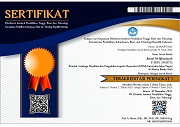DAMPAK TALAK DI LUAR PENGADILAN AGAMA TERHADAP KEHIDUPAN SOSIAL MASYARAKAT ACEH UTARA DAN ACEH BARAT
Abstract
Abstract: This research is entitled The Impact of Talaq Outside the Religious Courts on the Social Life of North Aceh and West Aceh. Divorce or divorce is the final path that must be taken in resolving domestic disputes and turmoil. The rift that occurs in the household can no longer be resolved, in fact, if it is allowed to drag on, it is feared that it will cause a split between the two sides of the family. The aim of this research is to determine the law of talak in religious courts and outside religious courts, the factors that cause talak outside religious courts and to identify the impact of talak outside religious courts on the social life of the people of North Aceh and West Aceh. This research uses a qualitative method, where the researcher thoroughly examines the facts at the research location according to the focus of the problem directly, then the data from the analysis is presented and a discussion is given. To obtain accurate and reliable data, data collection techniques are carried out through observation, interviews and documentation. The research results explain: (1) in Islamic terms, talak carried out outside a religious court is valid, while the law of talak outside a religious court is not legally valid in Indonesia and the Marriage Law and the Compilation of Islamic Law; (2) the factors that cause people to carry out divorce outside the religious courts are because they adhere firmly to the opinions of the Imams of the Madhab and local ulama, due to customary conditions, the economy, ignorance/incomprehension of regulations, laziness with the processing process and indifference to divorce laws and regulations. ; and (3) the impact felt by the community after carrying out talak outside the religious court is not getting the right to iddah, it is difficult to remarry because the divorce is not legal, because the KUA does not give permission because she still has the status of the wife of the first husband. Furthermore, you cannot claim joint property, hadhonah and child support. This is in accordance with what has happened to the people of North Aceh and West Aceh Regencies. Apart from that, the problems that arise as a result of talak outside the religious courts are regarding children and their education, there is no legal certainty, assets to whom, inheritance, will give rise to husbands having priority over wives, husbands being arbitrary towards wives, and child custody.
Keywords: Divorce; Religious Courts; Community Social Life.
Abstrak: Penelitian ini berjudul Dampak Talak di Luar Pengadilan Agama terhadap Kehidupan Sosial Aceh Utara dan Aceh Barat. Talak atau perceraian merupakan jalan akhir yang harus ditempuh dalam penyelesaian perselisihan dan kemelut rumah tangga. Keretakan yang terjadi dalam rumah tangga tidak dapat lagi dileraikan lagi, bahkan kalau dibiarkan berlarut dikhawatirkan akan menyebabkan perpecahan antara kedua belah pihak keluarga. Adapun tujuan penelitian ini adalah untuk mengetahui hukum talak di pengadilan agama dan di luar pengadilan agama, faktor penyebab terjadinya talak di luar pengadilan agama dan untuk mengidentifikasi dampak yang terjadi dari talak di luar pengadilan agama terhadap kehidupan sosial masyarakat Aceh Utara dan Aceh Barat. Penelitian ini menggunakan metode kualitatif, di mana peneliti secara menyeluruh meneliti fakta yang terdapat di lokasi penelitian sesuai dengan fokus permasalahan secara langsung, kemudian data hasil analisis disajikan dan diberikan pembahasan. Untuk mendapatkan data yang akurat dan terpercaya dilakukan dengan teknik pengumpulan data melalui observasi, wawancara dan dokumentasi. Hasil penelitian menjelaskan: (1) secara Islam, talak yang dilakukan di luar pengadilan agama sah, sedangkan hukum talak di luar pengadilan agama tidak sah secara hukum di Indonesia dan Undang-undang perkawinan serta Kompilasi Hukum Islam; (2) faktor yang menyebabkan masyarakat melakukan talak di luar pengadilan agama adalah karena memegang teguh pendapat para Imam Mazhab dan para ulama setempat, karena kondisi kebiasaan, perekonomian, ketidaktahuan/ketidakpahaman tentang peraturan, malas dengan proses pengurusan serta acuh terhadap aturan perundang-undangan perceraian; dan (3) dampak yang dirasakan oleh masyarakat setelah melakukan talak di luar pengadilan agama adalah tidak mendapatkan hak iddah, sulit melakukan pernikahan lagi karena tidak memiliki legalitas perceraiannya, karena pihak KUA tidak memberikan izin karena masih berstatus sebagai istri dari suami yang pertama. Selanjutnya, tidak dapat menuntut harta bersama, hadhonah dan nafkah anak. Hal ini sesuai dengan apa yang telah terjadi pada masyarakat Kabupaten Aceh Utara dan Aceh Barat. Di samping itu, problem yang muncul akibat talak di luar pengadilan agama adalah terhadap anak dan pendidikannya, tidak ada kepastian hukum, harta kepada siapa, warisan, akan menimbulkan perioritas suami lebih daripada istri, suami sewenang-wenang terhadap istri, dan hak asuh anak.
Kata Kunci: Talak; Pengadilan Agama; Kehidupan Sosial Masyarakat.
Full Text:
PDF INDONESIAReferences
Abdurrahman. (1986). Himpunan Peraturan Perundang-undangan tentang Perkawinan. Jakarta: Akademi Persindo.
Ghazaliy, Abdul Rahman. (2007). Fiqh Munakahat. Jakarta: Kencana.
Hamdani, Al. (1985). Risalah Nikah. Jakarta: Pustaka Amani.
Mugniyah, Jawad Muhammad. (2007). Fiqih Lima Mazhab. Jakarta: Lentera.
Nur, Djamaan. (1993). Fiqih Munaqahat. Semarang: CV. Toha Putra.
Sabiq, Sayyid. (2009). Fiqh Sunnah. Bandung: Al-Ma`arif.
Salim, As-Sayyid, bin Kamal bin Abu Malik. (2007). Shahih Fiqih Sunnah. Jilid 3. Jakarta: Pustaka Azzam.
Soemiyati. (2004). Hukum Perkawinan Islam dan Undang-Undang Perkawinan. Yogyakarta: Liberty.
Taqiyuddin. (2005). Kifayatul Akhyar, Juz II, Bandung: Al-Haromain Jaya.
DOI: http://dx.doi.org/10.22373/al-ijtimaiyyah.v9i2.22486
Refbacks
- There are currently no refbacks.
Sponsored by:
Member of:
Al-Ijitimaiyyah has been indexed by:
Reeference Tools:

This work is licensed under a Creative Commons Attribution-ShareAlike 4.0 International License.
© All rights reserved 2024. al ijtimaiyyah, p-ISSN : 2654-5217 | e-ISSN : 2461-0755
JURNAL AL-IJTIMAIYYAH. Published by Center for Research and Community Service (LP2M). Managed by Department of Islamic Community Development Faculty of Da'wah and Communication, UIN Ar-Raniry Banda Aceh, Aceh, Indonesia.


















